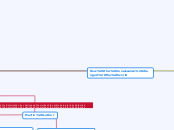Europeans saw Russia as savages and never paid much attention to them until they became more of a threat.
Europeans felt threatened by the growing Ottoman empire, and their gunpower
Roman Index
Roman Inquisition
Catholic Reformation
Control books being published
Lead to death of many innocent people
Catholic Church
Allowing copies of text and books to be accessed by others.
Printing Press
Shows people that the church has been lying to them.
Lutheranism was about getting people to live off the bible and not the church.
He created Lutheranism
He created “95 Thesis”
Martin Luther
Europeans relationship with the world
Russia
Ottoman Empire
East Asia
Saw foreigners as a threat
Europeans never managed to establish a trade with the Chinese
India
Europeans became involved in Indian politics and provided voluntary any support to rulers
Portuguese were the first to come to India for trade (spices)
Africa
Europeans began civil war and fought with African Kingdoms in order to take prisoners as slaves
The Americans
Europeans were kept captive by aboriginal people
Hudsone bay brought tension to the European trade
Fur trade was big in new france
People followed Lutheranism because it was the sole of religious truth.
The Reformation
Absolutism
Monarchs claim to have ultimate power to rule by divine right and they represent God's will. Also subjects had a religious duty to obey.
King Louis 14th
Believed he was the “God Given Child”/Sun God”. He executed the court to make him the absolute ruler.
James 1st
Believed God has chosen him as the “chosen one” and that he has ultimate power over everything. Created his own version of the bible which went against the Catholics.
Elizabeth 1st
Used her power to bring England to its golden age of art and wealth. Also what has never been seen before, she married England.
Queen Mary 1st (bloody Mary)
By using her absolute power, she tried to restore Catholicism and executed 300 people for being Protestant.
King Henry 8th
had complete control over England and did whatever he wanted. Since he left the Catholic church, he had ultimate power of all political, social, economic, and religious decisions.
King Henry created the church of England (Protestant) which split terms with the roman church and he declared England a Protestant state.
The Renaissance and its ideals
The plague
The start of the plague also known as “black death” which was a extremely devastating disease for the people at this time causing many deaths.
Population decreased leading to an economic depression but the people of this time wanted better which creating the transition to the renaissance.
Plague believed to be a punishment from God spread from fleas and rats and rapidly through trade greatly affecting economics for europeans who lived in poor conditions.
Meaning rebirth started in the 14th to the 16th century to reform the way of life.
Economy
As shown in the film Dangerous Beauty the rich had most power then the church then courtesans which were the only women allowed education but still had the restrictions of all women at that time.
Reformation
Printing press was invented allowing mass printing finally giving people the chance to be able to read.
New technology new system of astronomy and the discovery and exploration of new continents along with the flourishing philosophy, literature and art.
Greater scientific discoveries were in the area of astronomy and were refined by Isaac Newton and Francis Bacon giving people enlightenment on the subject.
A movement where intellectual economic and artistic aspects became more relevant.
Religion
Religious reformation began with the 95 theses created by Martin Luther causing a split with the Roman Catholic Church but still maintaining their faith.
If god was not pleased suffering would happen and there was inquisition towards the people with different beliefs or practices like heresy and people accused of witchcraft.
humanism
The founder of humanism Petrarch was a classical scholar who was known for his lyrical poetry helping lead to the renaissance.
Humanism came alive still not abandoning christianity but focused on human dignity and responsible citizenship
The people wanted change for the better to be able to value worldly life focus to on human potential.
How the renaissance changed the world

